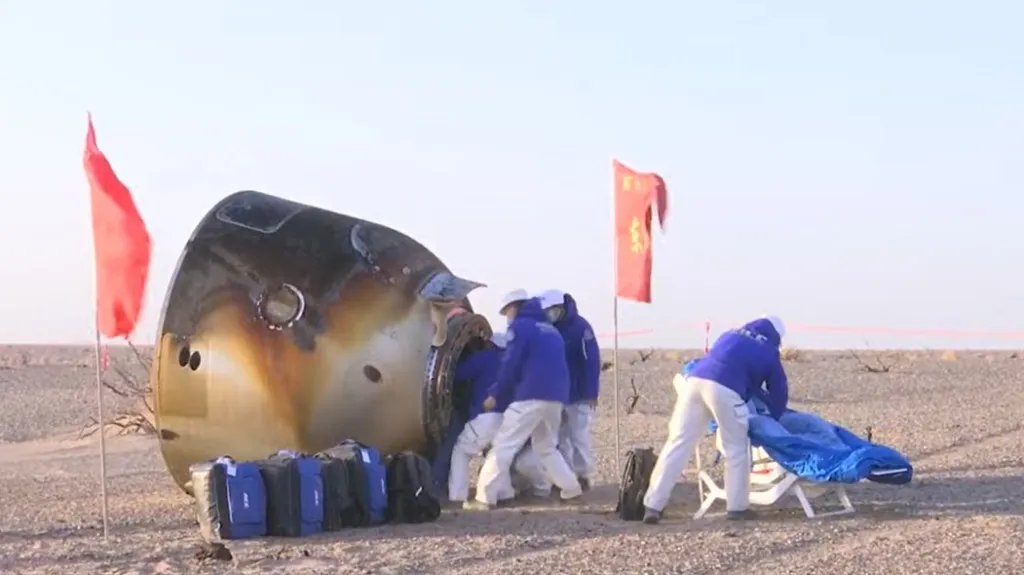Science
Chinese Astronauts Return Safely After Space Debris Delay

Chinese astronauts aboard the Shenzhou-20 spacecraft returned to Earth on November 14, 2025, after a week-long delay due to damage caused by an impact with space debris. The incident resulted in a crack in the spacecraft’s window, prompting the crew to leave the Tiangong space station using the newly arrived Shenzhou-21. The crew, which included Commander Chen Dong, Chen Zhongrui, and Wang Jie, was initially scheduled to land on November 5.
The delay was necessary as six taikonauts aboard the Tiangong space station conducted inspections of the Shenzhou-20 spacecraft, with assistance from mission controllers at the China Manned Space Agency (CMSA). In a statement released on November 11, the China Manned Space Engineering Office (CMSEO) indicated that assessment and backup return plans were being executed as planned. Ultimately, the crew departed the station aboard the Shenzhou-21 at 10:14 p.m. EST (7:14 p.m. PST) on November 13, after deeming their original spacecraft unsafe.
The astronauts successfully landed in Inner Mongolia at 11:14 a.m. Beijing Time on November 14 (9:14 p.m. EST; 6:14 p.m. PST, November 15). Following their return, medical teams confirmed that all three astronauts were in good health, according to state-owned media outlet Xinhua.
“Space exploration has never been easy for humankind. This mission was a true test, and we are proud to have completed it successfully,” Chen Dong stated to reporters. He emphasized the importance of safety, noting that “this experience has left us with a profound impression that astronauts’ safety is really prioritized.”
Significant Milestones for China’s Space Program
The return of the Shenzhou-20 crew marks several significant achievements for China’s space exploration efforts. Commander Chen Dong completed six extravehicular tasks during this mission, making him the taikonaut with the most extravehicular activities to date. Additionally, the crew became the first taikonauts to spend over 200 consecutive days in space.
They also celebrated a unique milestone by enjoying a barbecued meal in space, which was organized to welcome the incoming Shenzhou-21 crew, comprised of Zhang Lu, Wu Fei, and Zhang Hongzhang.
The CMSEO confirmed that the Shenzhou-21 spacecraft launched from the Jiuquan Satellite Launch Center on October 31, 2025, successfully delivering the replacement crew to the Tiangong station. The departure of the Shenzhou-20 crew leaves the Shenzhou-21 without a clear departure plan; however, this situation is expected to be addressed with the upcoming launch of the Shenzhou-22 spacecraft, which will not carry a crew.
Future of China’s Space Endeavors
This incident highlights a critical developmental milestone for China’s space program. It demonstrates the agency’s preparedness for unexpected situations that can arise in space. The backup plans in place ensure that operations aboard the Tiangong space station will continue uninterrupted.
As the International Space Station (ISS) approaches retirement, China aims for the Tiangong station and its successors to sustain human exploration and scientific efforts in Low Earth Orbit (LEO). The successful completion of this mission reinforces China’s commitment to becoming a key player in the future of space exploration.
With these advancements, China continues to pave the way for new opportunities in the realm of space science and exploration, fostering a spirit of innovation and resilience essential for the challenges that lie ahead.
-

 Science4 weeks ago
Science4 weeks agoInventor Achieves Breakthrough with 2 Billion FPS Laser Video
-

 Health1 month ago
Health1 month agoCommunity Unites for 7th Annual Into the Light Walk for Mental Health
-

 Top Stories1 month ago
Top Stories1 month agoCharlie Sheen’s New Romance: ‘Glowing’ with Younger Partner
-

 Entertainment1 month ago
Entertainment1 month agoDua Lipa Aces GCSE Spanish, Sparks Super Bowl Buzz with Fans
-

 Business1 month ago
Business1 month agoTyler Technologies Set to Reveal Q3 Earnings on October 22
-

 Entertainment1 month ago
Entertainment1 month agoMother Fights to Reunite with Children After Kidnapping in New Drama
-

 World1 month ago
World1 month agoR&B Icon D’Angelo Dies at 51, Leaving Lasting Legacy
-

 Health1 month ago
Health1 month agoCurium Group, PeptiDream, and PDRadiopharma Launch Key Cancer Trial
-

 Entertainment1 month ago
Entertainment1 month agoRed Sox’s Bregman to Become Free Agent; Tigers Commit to Skubal
-

 Health1 month ago
Health1 month agoNorth Carolina’s Biotech Boom: Billions in New Investments
-

 Science1 month ago
Science1 month agoNorth Carolina’s Biotech Boom: Billions Invested in Manufacturing
-

 Top Stories1 month ago
Top Stories1 month agoDisney+ Launches Chilling Classic ‘Something Wicked’ Just in Time for October









